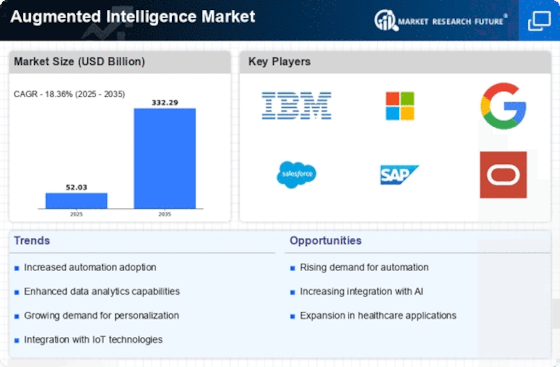Top Industry Leaders in the Augmented Intelligence Market

The Competitive Landscape of Augmented Intelligence:
The Augmented Intelligence (AI) market, poised for explosive growth, presents a dynamic and fiercely competitive landscape. Here, we delve into the key players, their strategies, market share determinants, rising stars, and current investment trends. This explosive growth is fueled by the increasing demand for enhanced decision-making across industries, the proliferation of complex data, and the continuous advancements in AI technologies. Let's delve into this dynamic ecosystem, exploring key players, their strategies, and factors influencing market share analysis.
Key Players:
- Intel
- Nvidia
- Samsung Electronics
- Xilinx
- Micron Technology
- IBM
- Microsoft
- Amazon Web Services (AWS)
- Baidu
- Oracle
- Salesforce
- SAS
- SAP
- General Electric
- Cisco
- Rockwell
- Siemens AND Mellanox Technologies
- MondoBrain Inc.
- Sisense
- Cosmo Tech
- Qlik
- Quartic.ai
Strategies for Success:
Competitive differentiation in this space hinges on several key strategies:
- Technology Leadership:Investing in cutting-edge AI algorithms, robust data platforms, and user-friendly interfaces is crucial for attracting and retaining customers.
- Vertical Focus:Targeting specific industries with tailored solutions and deep domain expertise helps establish brand leadership and market share dominance in niche segments.
- Partnerships and Acquisitions:Collaborating with complementary technology providers and acquiring promising startups allows for rapid expansion and access to new technologies and markets.
- Ecosystem Development:Building a robust ecosystem of developers, partners, and customers fosters innovation and accelerates market adoption.
Factors for Market Share Analysis:
Several factors influence the competitive landscape and market share analysis:
- Product Portfolio and Breadth:Offering a comprehensive suite of AI solutions across various technologies and applications widens the customer base and strengthens market position.
- Customer Satisfaction and Retention:Providing excellent customer support, ongoing innovation, and value-driven solutions fosters loyalty and brand advocacy.
- Pricing and Deployment Flexibility:Catering to diverse budget needs through flexible pricing models and deployment options (cloud, on-premise, hybrid) expands market reach.
- Global Presence and Scalability:Having a strong global footprint and the ability to scale operations across different regions is essential for long-term success.
New and Emerging Players:
The augmented intelligence landscape is constantly evolving, with new and emerging players adding fresh perspectives and disrupting traditional market dynamics. Some notable startups to watch include:
- C3.ai:Developing an enterprise AI platform for predictive analytics and intelligent automation.
- Dataiku:Democratizing AI with a collaborative data science platform.
- H2O.ai:Providing an open-source AI and machine learning platform for businesses.
- Scale AI:Building an AI platform for the industrial sector.
- Sentient Technologies:Developing AI-powered predictive maintenance solutions for the manufacturing industry.
Current Investment Trends:
Companies across industries are actively investing in augmented intelligence solutions to gain a competitive edge. Key areas of investment include:
- Sales and Marketing:AI-powered customer segmentation, lead scoring, and personalized marketing campaigns.
- Operations and Supply Chain:Predictive maintenance, logistics optimization, and automated workflow management.
- Finance and Risk Management:Fraud detection, credit risk assessment, and algorithmic trading.
- Human Resources:Talent acquisition and retention, employee performance management, and personalized learning.
- Customer Service:Chatbots, virtual assistants, and AI-driven sentiment analysis for improved customer experience.
Latest Company Updates:
December 27, 2023, Research on "neuro-adaptive" Augmented Intelligence systems to personalize experiences and optimize human-machine collaboration.
November 28, 2023, Development of brain-computer interfaces (BCIs) opens up possibilities for direct control of AR/VR environments.
October 31, 2023, Advancements in haptic feedback technology promise more immersive and interactive AR experiences.










